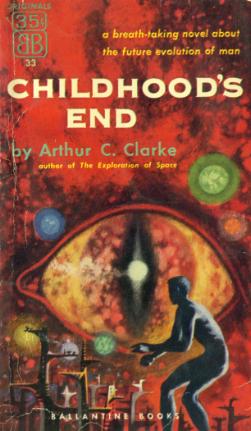"Childhood's End" by Arthur C. Clarke
The Overlords appeared suddenly over every city--intellectually, technologically, and militarily superior to humankind. Benevolent, they made few demands: unify earth, eliminate poverty, and end war. With little rebellion, humankind agreed, and a golden age began.
But at what cost? With the advent of peace, man ceases to strive for creative greatness, and a malaise settles over the human race. To those who resist, it becomes evident that the Overlords have an agenda of their own. As civilization approaches the crossroads, will the Overlords spell the end for humankind . . . or the beginning?
Kurt Vonnegut said of Arthur C. Clarke’s novel Childhood’s End that it is one of the few masterpieces in the science fiction genre. Vonnegut went on to say that he, Vonnegut, had written all the others.
As humorous as that is, at least the first clause of that declaration I feel to be true. Written simply but with conviction and persuasion, with an almost fable-like narrative quality, Clarke has given to us that rarest of literary achievements: a science fiction masterpiece.
The genius of Clarke’s achievement is compounded by the fact that his accomplishment remains so unique, how have later artists failed to match or even make an attempt at duplication? I especially liked the racial memory (or racial premonition) ideas and the ideas of collective consciousness. Interestingly, Clarke’s concepts could be seen as having a theological transcendent theme, perhaps even an allegory for awakening to a collective ego.
Clarke’s ingenuity remains untouched and this work stands atop the science fiction canon, comparable to only a handful of other science fiction classics, including the novel that won the Hugo Award in 1954, the same year Childhood’s End was nominated for that award, Ray Bradbury’s Fahrenheit 451. (Lyn, GoodReads)
But at what cost? With the advent of peace, man ceases to strive for creative greatness, and a malaise settles over the human race. To those who resist, it becomes evident that the Overlords have an agenda of their own. As civilization approaches the crossroads, will the Overlords spell the end for humankind . . . or the beginning?
Kurt Vonnegut said of Arthur C. Clarke’s novel Childhood’s End that it is one of the few masterpieces in the science fiction genre. Vonnegut went on to say that he, Vonnegut, had written all the others.
As humorous as that is, at least the first clause of that declaration I feel to be true. Written simply but with conviction and persuasion, with an almost fable-like narrative quality, Clarke has given to us that rarest of literary achievements: a science fiction masterpiece.
The genius of Clarke’s achievement is compounded by the fact that his accomplishment remains so unique, how have later artists failed to match or even make an attempt at duplication? I especially liked the racial memory (or racial premonition) ideas and the ideas of collective consciousness. Interestingly, Clarke’s concepts could be seen as having a theological transcendent theme, perhaps even an allegory for awakening to a collective ego.
Clarke’s ingenuity remains untouched and this work stands atop the science fiction canon, comparable to only a handful of other science fiction classics, including the novel that won the Hugo Award in 1954, the same year Childhood’s End was nominated for that award, Ray Bradbury’s Fahrenheit 451. (Lyn, GoodReads)


Comments
Post a Comment